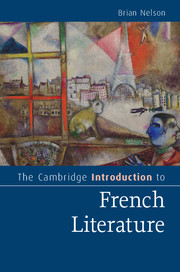Book contents
- Frontmatter
- Dedication
- Contents
- Preface
- Acknowledgements
- Chronology
- 1 Villon: a dying man
- 2 Rabelais: the uses of laughter
- 3 Montaigne: self-portrait
- 4 Corneille: heroes and kings
- 5 Racine: in the labyrinth
- 6 Molière: new forms of comedy
- 7 La Fontaine: the power of fables/fables of power
- 8 Madame de Lafayette: the birth of the modern novel
- 9 Voltaire: the case for tolerance
- 10 Rousseau: man of feeling
- 11 Diderot: the enlightened sceptic
- 12 Laclos: dangerous liaisons
- 13 Stendhal: the pursuit of happiness
- 14 Balzac: ‘All is true’
- 15 Hugo: the divine stenographer
- 16 Baudelaire: the streets of Paris
- 17 Flaubert: the narrator vanishes
- 18 Zola: the poetry of the real
- 19 Huysmans: against nature
- 20 Mallarmé: the magic of words
- 21 Rimbaud: somebody else
- 22 Proust: the self, time and art
- 23 Jarry: the art of provocation
- 24 Apollinaire: impresario of the new
- 25 Breton … Company: Surrealism
- 26 Céline: night journey
- 27 Sartre: writing in the world
- 28 Camus: a moral voice
- 29 Beckett: filling the silence
- 30 French literature into the twenty-first century
- Notes
- Further reading
- Index of authors and titles
- Index of genres, movements and concepts
- Cambridge Introductions to …
- References
2 - Rabelais: the uses of laughter
Published online by Cambridge University Press: 05 July 2015
- Frontmatter
- Dedication
- Contents
- Preface
- Acknowledgements
- Chronology
- 1 Villon: a dying man
- 2 Rabelais: the uses of laughter
- 3 Montaigne: self-portrait
- 4 Corneille: heroes and kings
- 5 Racine: in the labyrinth
- 6 Molière: new forms of comedy
- 7 La Fontaine: the power of fables/fables of power
- 8 Madame de Lafayette: the birth of the modern novel
- 9 Voltaire: the case for tolerance
- 10 Rousseau: man of feeling
- 11 Diderot: the enlightened sceptic
- 12 Laclos: dangerous liaisons
- 13 Stendhal: the pursuit of happiness
- 14 Balzac: ‘All is true’
- 15 Hugo: the divine stenographer
- 16 Baudelaire: the streets of Paris
- 17 Flaubert: the narrator vanishes
- 18 Zola: the poetry of the real
- 19 Huysmans: against nature
- 20 Mallarmé: the magic of words
- 21 Rimbaud: somebody else
- 22 Proust: the self, time and art
- 23 Jarry: the art of provocation
- 24 Apollinaire: impresario of the new
- 25 Breton … Company: Surrealism
- 26 Céline: night journey
- 27 Sartre: writing in the world
- 28 Camus: a moral voice
- 29 Beckett: filling the silence
- 30 French literature into the twenty-first century
- Notes
- Further reading
- Index of authors and titles
- Index of genres, movements and concepts
- Cambridge Introductions to …
- References
Summary
… laughter is of man the very marrow.
– Rabelais, Gargantua, ‘To the Reader’The comic fictions of the scholar, physician and one-time monk François Rabelais (?1494–1553), and the senses in which he may be described as ‘a Renaissance writer’, cannot be fully understood without a knowledge of the historical context in which he wrote. The Renaissance is commonly held to mark the end of the Middle Ages and the beginning of the modern world. The term ‘Renaissance’, derived from the French word for rebirth, refers to a cultural movement that began in fourteenth-century Italy and lasted in Western Europe into the early seventeenth century. Invigorating both the arts and the sciences, it was marked by a revival of interest in classical Greek and Roman texts, a spirit of intellectual and physical adventure, and a belief in the high potential of human nature and of the individual human being – a belief that fundamentally challenged the theocentric view of the universe embodied in the medieval Church. Above all, the Renaissance gave birth to the idea of learning as the foundation of life. The broad system of values animating the Renaissance has been called ‘humanism’. The astonishing intellectual scope, the formal and linguistic inventiveness, and the general ebullience of Rabelais's writings, known collectively as Gargantua and Pantagruel, embody Renaissance humanism in all its excitement and thirst for knowledge. As Erich Auerbach writes: ‘Rabelais’ purpose … is diametrically opposed to medieval ways of thinking … [His] entire effort is directed toward playing with things and with the multiplicity of their possible aspects; upon tempting the reader out of his customary and definite way of regarding things, by showing him phenomena in utter confusion; upon tempting him out into the great ocean of the world, in which he can swim freely, though it be at his own peril' (Mimesis, pp. 275–76).
- Type
- Chapter
- Information
- The Cambridge Introduction to French Literature , pp. 8 - 16Publisher: Cambridge University PressPrint publication year: 2015

